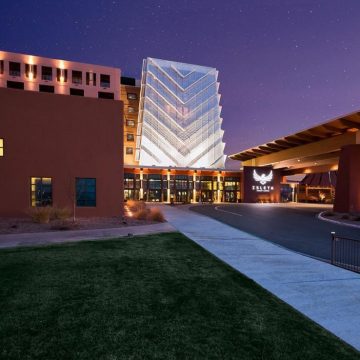
Five New Mexico-based Native American gaming tribes have filed a federal lawsuit against the southwestern U.S. state. The five tribes, which each operate their own casinos, is fighting New Mexico’s government’s attempt to collect $40 million in revenue-sharing payments retroactively.
The lawsuit is part of a 3-year pattern in which the administration of Susana Martinez has sought additional taxes from New Mexico’s Native American tribes. The resulting legal battles have seen both sides win victories, though the US Interior Department’s Bureau of Indian Affairs sided with the tribes on one occasion, claiming Martinez’s stance violates the 1988 Indian Gaming Act.
Pueblo of Isleta Lawsuit: June 2017
New Mexico’s collection attempts steam from a free-play credit incentive program that were a part of a now-expired 2007 gaming compact. The lawsuit was filed last month by the federally-recognized Pueblo of Isleta, which operates the Isleta Resort Casino just outside Albuquerque. The Pueblo of Islete filed its lawsuit in the United States District Court for New Mexico in Sante Fe after the state claimed the tribe owed it $10.3 million.
4 Tribes Join the Lawsuit: July 2017
The state also demanded $26.5 million from the Pueblo of Sandia tribe, which runs the Sandia Resort and Casino. New Mexico’s administration demanded $3.2 million from the Pueblo of Tesuque, which operates the Camel Rock Casino north of Sante Fe. Both tribes joined the lawsuit after they heard about Pueblo of Islete’s action.
The Pueblo of Santa Clara, which runs the Santa Claran Hotel Casino north of Sante Fe also joined the lawsuit. So did the Pueblo of Santa Ana, which operates the Santa Ana Star Casino. Neitehr of the latter two tribes have received demands from the state, though they expect they will be targeted along with their fellow Pueblo tribesmen.
New Mexico Gaming Revenue-Sharing Program
The five tribes are asking the for the state’s attempts to collect retroactive revenue-sharing funds to be declared illegal. The defendants in the lawsuit are the New Mexico Gaming Control Board, Jeffrey Landers (the board’s chairman), and New Mexico Governor Susana Martinez.
Free-play credits are given to casino customers to incentivize them to gamble on slot machines. The state argues that tribes should pay the full amount of the slots gambling, instead of taxes only on the discounted amount.
Tribes Argue Added Taxation Is Illegal
The plaintiffs in the lawsuit claim that the state’s interpretation of the free-play taxation flies in the face of accepted federal law. The tribe’s lawyers used the analogy of the state trying to collect taxes on the full price of a shirt sold at a discount.
The Pueblo tribes’ legal brief in the case stated, “By unilaterally requiring that free-play credits be treated as revenues, the defendants are imposing an exaction on each Pueblo’s use of free-play that violates the per se rule of federal law that bars state taxation of an Indian tribe unless Congress has authorized such taxation in terms that are unmistakably clear and the Indian Gaming Regulatory Act, which provides that a state may not ‘impose any tax, fee, charge or other assessment upon an Indian tribe’ under a tribal-state compact.”
Free-Play Credits in Other States
US states like Ohio have considered changing their gaming laws to charge taxes on the full price of free-play credits in the past few years. The casinos in those states argue that such taxes would hurt their marketing and drive players out of state, because the casinos would discontinue their programs and players might visit casinos in nearby states. Never did Ohio or the other midwestern states suggest casinos should pay taxes on discounted gaming retroactively.
2015 Pojoaque Pueblo Lawsuit
This is not the first time tribes have accused the administration of Gov. Susana Martinez of unfair treatment. The Pojoaque Pueblo Tribe has been involved in a lawsuit with New Mexico since June 2015, when the tribe’s gaming compact ended. The Pojoaque Pueblo own two casinos in the state, including the Buffalo Thunder Resort & Casino near Santa Fe.
The lawsuit in that case stemmed from New Mexico requiring the tribe to pay higher taxes under the successor gaming compact, without giving any concessions in return. Under terms of the 1998 Indian Gaming Act, states can assess taxes on a tribe’s casino operations to offset the costs of regulations. If they want to assess special taxes in excess of basic operational costs, then the state must provide special concessions to the tribe, such as a gaming monopoly on certain types of games or a monopoly in a certain section of the state. Since Gov. Martinez’s administration demanded higher taxes, but was unwilling to offer concessions, the Pojoacque Pueblo argued in court that New Mexico is violating the law. The case is still pending.
2017 Dispute between Pojoaque Pueblo and Gov. Martinez
Earlier this year, the New Mexico Gaming Control Board called for additional taxes on revenue-sharing slot machines leased by the tribe’s Buffalo Thunder Casino from International Game Technology, Bally Technology and WMS. The tribe shut down the 30 leased slots, instead of paying additional taxes.















